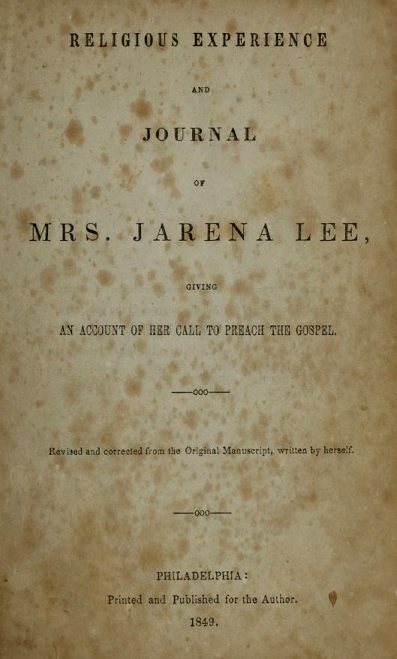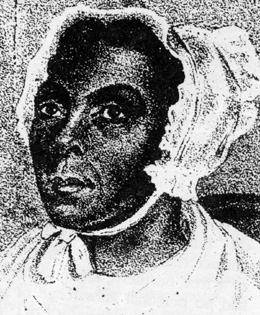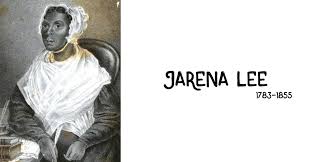
Life for black American women in the last three centuries has taken many turns from slavery to emancipation and from obscurity to world-wide recognition. In spite of obtaining constitutional freedom, continued racism still affects black women economically, politically, and religiously. But the women have not let the obstacles before them keep them from following their callings from God to serve in His kingdom.
We began this series by sharing the story of the first black female writer to be published – the poet Philis Wheatley. We continued our series with an emancipated slave who became a black itinerant evangelist, abolitionist, women’s rights activist and writer – Sojourner Truth. For the next few weeks we will relate the stories of black female preachers from the nineteenth century. Yes, you read this right – there were many courageous black women who preached as the Holy Spirit moved them. Many thousands of people were led to Christ through their ministries. Anyone – female or male, black or white, poor or rich, may share the Gospel (Joel 2:28 and Galatians 3:28).
Last week we took a first look at the life of Jarena Lee. We shared the details of her childhood and conversion. Jarena accepted her call as an evangelist. This week we examine her thought and writing further.
Jarena Lee (1783 – 1864) Part 2
“Go preach the Gospel!”
These are the words that Jarena Lee distinctly heard one day a few years after she was saved and “sanctified”.
It is not my purpose to discuss theology at this time. Jarena Lee held to a view of sanctification that was Wesleyan Methodist. Many have debated John Wesley’s view of “perfectionism”, but at the very least, Christians are called to live “in the world” but not be “of the world”. This takes a commitment on the part of believers and reliance on the Holy Spirit to do the sanctifying work. Some believe that sanctification comes all at once as a “second blessing” and others believe that there may be an initial blessing from the Holy Spirit as He causes the Christian to realize that, though saved, she still sins and needs more help. Thus begins a process called “progressive sanctification”.
In any event, Jarena knew that she was called to a purpose that involved more than just her own personal comfort. The Holy Spirit gives gifts to men and women alike. All are called to exercise those gifts to build up the Kingdom of Christ. How are women to exercise their gifts? In the early nineteenth century as well as today there are many who restrict women to using their gifts in the home only. For example, women may teach their children at home, but women may not exercise the gift of teaching in public. Some say they may never exercise the gift of preaching because that is for men only.
Again, this is a discussion that I would like to continue at another time. I invite you, readers, to jump in here with your thoughts. What gifts does the Holy Spirit give to women? When may they use them? Consider looking at Joel 2:28 and Galatians 3:28 and I Corinthians 12.
Recall that the last posting, “Jarena Lee – Part 1”, I recounted the story of the first time Jarena approached Rev. Richard Allen and told him about her call to preach. He turned her away. He told her about a woman who was given permission to lead prayer meetings and to “exhort” under a licensed preacher, but he believed that women should not preach.
At first, Jarena was a bit relieved to hear this. Later she honestly acknowledged that it was her own fear of following her call that made her glad to hear Rev. Allen’s reply. However she found that not heeding her call made her lose her burning desire to tell others of Jesus Christ.
In the meantime, Jarena married, had children, and was widowed over the space of six years. She had occasions to speak to others about their souls, warning them to flee from the wrath to come. She still longed to preach the Gospel but was obedient to God in her present calling of wife and mother.
After eight years had gone by since the first time she applied to Rev. Allen, she received a fresh impression in her mind “as a fire shut up in my bones” to go and preach. She approached the now Bishop Richard Allen and simply asked for permission to hold prayer meetings. He granted that to her. This she did for some time.
Jarena’s account of her first opportunity to preach in public was given in Part 1. This was the story of her impromptu preaching from the book of Jonah. She was not sure of how she would be received, but actually she was well received and began her public ministry.
It was important to Jarena that her call was truly of God. She did not want it to be of her own desire or to be a temptation from Satan. She recognized the devil could “transform himself into an angel of light for the purpose of deception.” The first time Jarena heard her call she was very careful to make sure it was from the Lord. She immediately “went into a secret place, and called upon the Lord to know if he had called me to preach, and whether I was deceived or not; when there appeared to my view the form and figure of a pulpit, with a Bible lying thereon, the back of which was presented to me as plainly as if it had been a literal fact.” In other words, Jarena had a vision. That night she had a vivid dream. She took a text and preached in her sleep. This convinced her of her call and she approached Rev. Allen for that first time.[1]
When she began her public ministry, Jarena defended her right to preach on three grounds. First was God’s direct call to her. Secondly, she could point to the results. There was no doubt about the support she received from men and women. And third, there were the Scriptures.
Along with other black and white women who wanted to serve by using their call to preach, Jarena pointed to many Scriptures in support of her ministry. Here in her own words is her defense:
“If a man may preach, because the Saviour died for him, why not the woman? seeing he died for her also.”[2]
“Did not Mary first preach the risen Saviour, and is not the doctrine of the resurrection the very climax of Christianity — hangs not all our hope on this, as argued by St. Paul? Then did not Mary, a woman, preach the gospel? for she preached the resurrection of the crucified Son of God.
But some will say, that Mary did not expound the Scripture, therefore, she did not preach, in the proper sense of the term. To this I reply, it may be that the term preach, in those primitive times, did not mean exactly what it is now madeto mean; perhaps it was a great deal more simple then, than it is now: — if it were not, the unlearned fishermen could not have preached the gospel at all, as they had no learning.”
Some might reply that only men are inspired to preach the gospel. Jarena replied, “If then, to preach the gospel, by the gift of heaven, comes by inspiration solely, is God straitened; must he take the man exclusively? May he not, did he not, and can he not inspire a female to preach the simple story of the birth, life, death, and resurrection of our Lord, and accompany it too, with power to the sinners’ heart. As for me, I am fully persuaded that the Lord called me to labour according to what I have received, in his vineyard. If he has not, how could he consistently bear testimony in favour of my poor labours, in awakening and converting sinners?”
How indeed?
Jarena’s story is one of a series of a number of women that we will be exploring over the coming weeks. Was Jarena’s call real, or only the product of a vivid imagination? If a woman’s call to preach is real, how should we deal with it? Is the call to share the Gospel with others for all Christians or just men?
More in the weeks to come.
[1]Jarena Lee. “The Life and Religious Experience of Jarena Lee, A Coloured Lady, Giving and Account of Her Call to Preach the Gospel.” (Printed and Published for the Author 1836 in Philadelphia). Account of her call pages 35-38. From William L. Andrews, Editor.Sisters of the Spirit: Three Black Women’s Autobiographies of the Nineteenth Century. (Bloomington and Indianapolis, IN: Indiana University Press, 1986).
[2]Ibid. These quotes pages 35 – 38.



